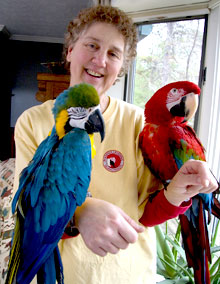Parrots are truly companions for life. They’re beautiful, highly intelligent and have an amazing amount of personality. Perhaps that’s why so many people are eager to share their homes with a feathered friend.

As majestic as parrots can be, however, caring for one is an enormous responsibility. Loud and messy by nature, these birds need a lot of attention and love over the long term: A healthy parrot may live 75 years or more. And responsible ownership requires more than love; it takes a strong commitment to learning and a fierce devotion to the bird’s well-being. That helps explain why so many parrots end up malnourished, neglected, abandoned and abused. When adopting a parrot, a family must be willing to turn into a flock.
Madison County resident Ann Brooks found out just how challenging a bird can be when, on a whim, she bought Phoenix, an 8-week-old scarlet macaw, at a local pet store. “It didn’t take long after coming home before I realized that I had made a very serious decision,” confesses Brooks. “Like many first-time bird owners, I didn’t know how to take care of her and felt helpless, with no one to turn to.”
But helplessness is not in Brooks’ nature, and in April of 2000, she launched Phoenix Landing, a 501(c)(3) nonprofit organization to help relinquished, abused and neglected parrots. She started with a vision: to build a free-flight center where Phoenix and others like her could enjoy long and healthy lives.
Over the last seven years, Phoenix Landing has seen extraordinary growth. Thanks to a network of hundreds of volunteer “foster parents” ranging from Washington, D.C., to Georgia, the group now takes in more than 250 birds a year. “Adoption is a valuable aspect of what we do,” Brooks explains. “These birds enjoy having a family to dote on them; their lives are greatly enriched with a loving home. And we always, always need more volunteers and foster families.”
Another key component of Phoenix Landing’s work is teaching people how to care for their charges. “Education is absolutely the most important thing we do,” she proclaims. “That’s the way we touch the lives of far more birds than will ever come into our adoption program. People who are attentive to their birds know that they are indeed a challenge, and to live with them successfully means keeping up to speed with their needs, diet, health and enrichment.”
“Parrots’ Point of View” and “Things I Wish I’d Known,” two of many educational workshops the group offers in eight cities throughout the Southeast, are required courses for families looking to adopt a parrot. But the most important quality for foster parents is “willingness to learn,” says Mary Ault, the coordinator for Western North Carolina, parts of Virginia and Tennessee.
Brooks herself shares her life with three macaws: Phoenix, “who started it all”; Dallas, who’s from Canada; and Fred, who spent 20 years of her life in a small cage in a pet store. Years without toys or even clean water left Fred as featherless as store-bought chicken, says Brooks. Pulling out feathers is one of many responses birds have to captivity, boredom and neglect. But Fred has made a comeback and is now a full-feathered beauty, though she still needs encouragement when drinking: “Good, good water! Fred drinks her water!”
Brooks typically also cares for a foster parrot—currently Zeus, a large umbrella cockatoo who’s looking for a permanent home. Like most male cockatoos, Zeus is loud. He needs a family that’s willing to learn, work and commit to loving him.
The goal, says Brooks, is to treat “every bird that comes into our program [the way] I hope somebody will treat Phoenix 20 and 30 years from now.” But the need far outstrips the group’s ability to help. “We always have many, many birds that we can’t even pick up because there’s no room in the program,” she notes. But Phoenix Landing is still a work in progress, and Brooks says she has a “big project on the horizon.”
“We’re working with architects to [plan and design] a facility to hold national-level conferences where people can learn about parrots, an adoption center where birds can land temporarily, a medical-support center and a series of free-flight spaces for parrot residences.” It’s a tall order, but the group has already acquired 64 acres in Madison County.
“We’re really going to have to work on our capital campaign, but we’re hoping to launch it in the first half of this year,” says Brooks. “We want [the facility] to be a role model for people to come and learn. I can see us offering an A-Z parrot-care course, and I know people will come. I don’t think we’re going to turn the tide of so many unwanted birds until we can make sure that education is rock-solid.”
And anyone who doubts Brooks’ ability to pull off this ambitious project needs only to hear her talk about “her” birds; her passion is infectious.
“As the days, weeks and years go by, you look into your parrot’s soulful eyes and you realize how incredibly intelligent they are and how much they are deprived in captivity. I knew I could not [abandon] Phoenix. … There had to be a [long-term] plan. I think everyone who loves their bird feels that way. I have a responsibility—I made her a promise, and I will make sure Phoenix gets her landing.”
Visit www.phoenixlanding.org to learn more.



Sorry, but the website address is http://www.phoenixlanding.org. Thanks
I can tell you first hand what a wonderful organization this is! I have greenwing macaw that I am currently adopting from Phoenix Landing and have helped transport and do home checks.
If you’ve always wanted a parrot, but don’t have the time you can help out in so many small ways. Transport, donations, getting the word out. Nothing is too small!